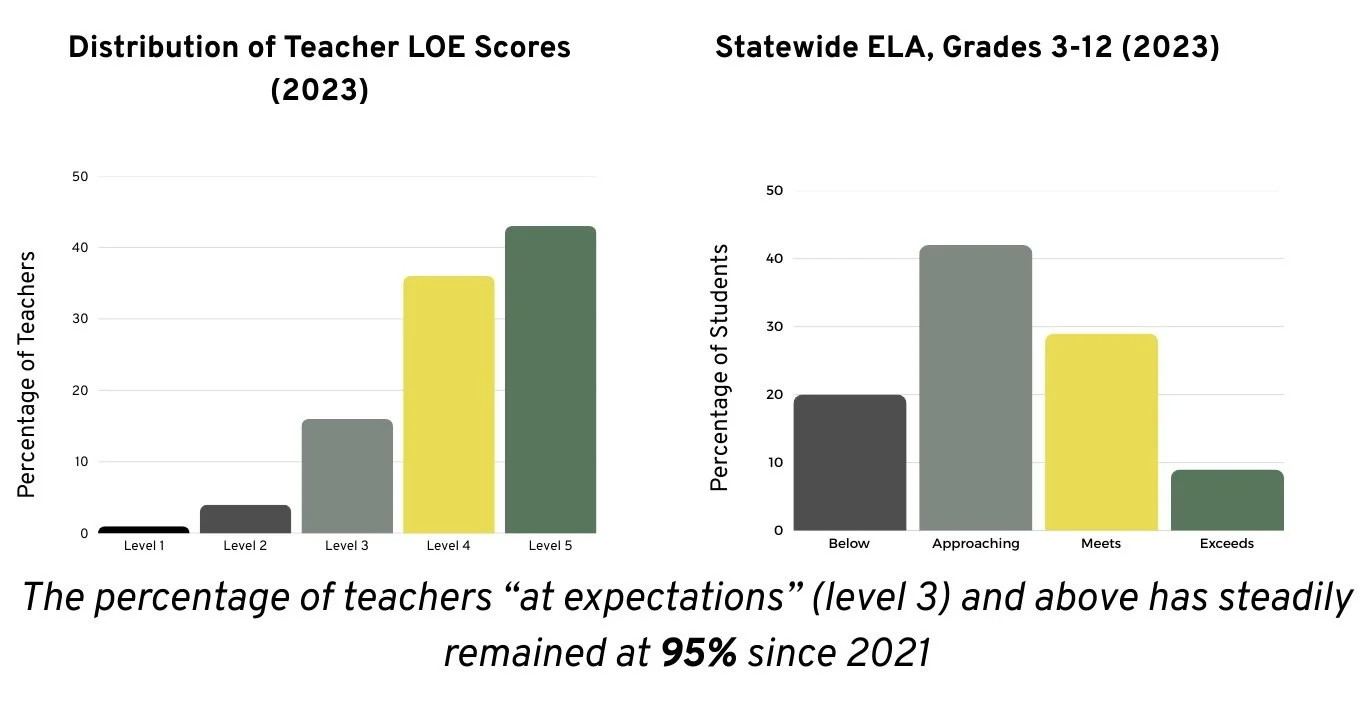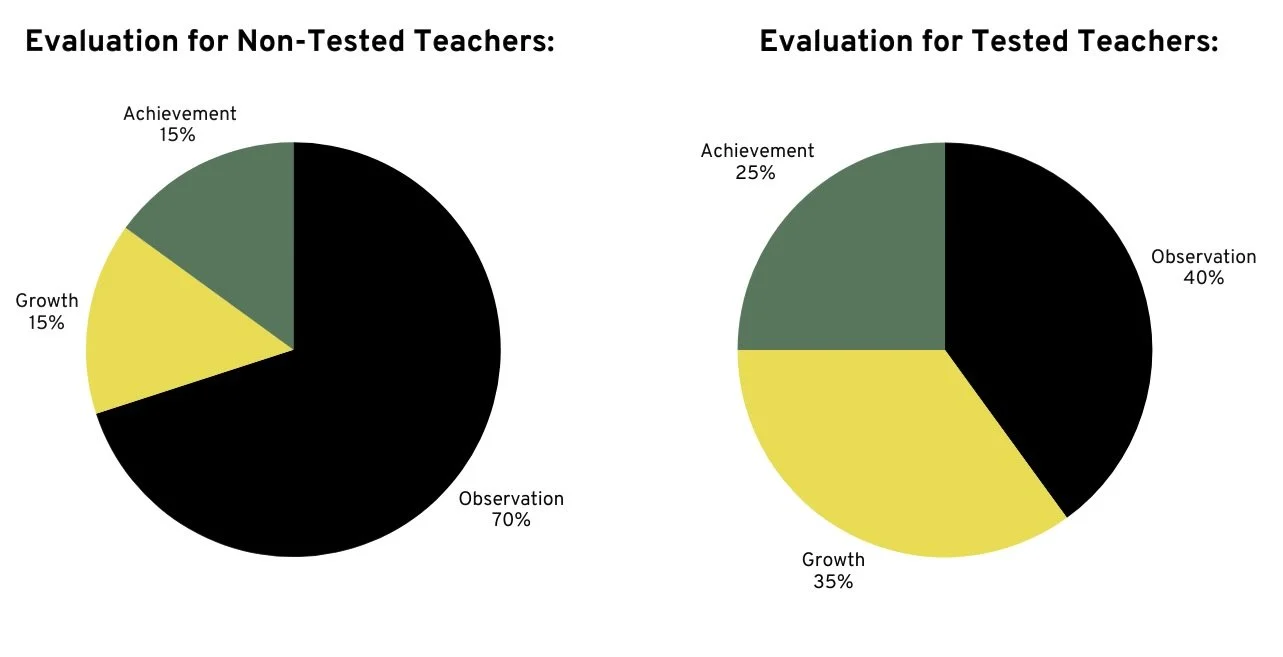Tennessee Lawmakers Express Interest in Tweaks to the Teacher Evaluation System while Preserving its Annual Timeline
Stock photo of a teacher in a classroom (Photo by Photo by Max Fischer/Pexels)
Tennessee lawmakers appear to be poised to suggest changes to the teacher evaluation system to more closely mirror what the state is seeing in student performance.
Currently, 96 percent of teachers receive a level of effectiveness (LOE) grade of three (meeting expectations) to five (significantly above expectations) on the Tennessee Educator Acceleration Model (TEAM) evaluation system.
Multiple lawmakers serving on the Advisory Committee on Innovations in K-12 Education expressed concern that the grades may not accurately reflect teacher effectiveness in a state where most students routinely score below proficient on state testing in subjects like English language arts (ELA).
State Representative William Slater, R-Gallatin, was among those questioning the disparity at a hearing on the TEAM system Wednesday afternoon. He suggested bias might be a factor, considering each teacher is observed by someone from their own district.
State Representative William Slater (Photo by the Tennessee General Assembly)
“So, there doesn’t seem to be a correlation between where we are right now with evaluation and how that is being reflected in our student achievement,” said Slater. “Observers are observing folks that they likely may have gone to school with or worked with for a long period of time, and so, whether intentional or not, and I would argue probably not intentional, that there’s too much subjectivity in that observation.”
TEAM Credited with Student Achievement Growth
Tennessee implemented the existing TEAM system in 2011 as part of an effort to reform the prior evaluation system, which only required some teachers to be evaluated twice in a decade.
Under TEAM, educators are evaluated at least once a year, and the overall grade is based on observation, student growth, and student achievement. Teachers who teach non-tested subjects, like art, receive 70 percent of their score from observations, while those teaching tested subjects like ELA receive 40 percent of their score from classroom observations.
Non-tested teachers frequently receive their achievement and growth scores through a composite of school-level results.
Tennessee Department of Education Chief Academic Officer Kristy Brown told members on the advisory committee that surveys show more than 80 percent of teachers support TEAM, and the evaluation changes that came with it have made a major impact on student performance.
“Implementation of the TEAM evaluation system was a powerful precondition that led to Tennessee becoming the fastest growing state on the NAEP (National Assessment of Educational Progress) assessment, and statewide TCAP (Tennessee Comprehensive Assessment Program) achievement data has also risen at a comparable rate,” said Brown.
Union Support for Reduced Evaluations
State lawmakers considered reducing the evaluation frequency of teachers who “meet expectations” on TEAM during the legislative session earlier this year. Those efforts included the support of the Tennessee Education Association (TEA), which referred to the legislation as the “Freedom to Teach” bill.
TEA Manager of Government Relations and Research Drew Sutton reiterated support for reduced evaluation frequency at Wednesday’s hearing.
State Representative Adam Lowe (Photo by the Tennessee General Assembly)
“There may be a way to rethink, still supporting our most effective educators, but still freeing up that additional time that administrators have told us, at least consistently, there’s just not enough time in the day to get quality in-depth feedback to every educator that needs it the most,” said Sutton.
State Senator Adam Lowe, R-Calhoun, said one barrier to rolling back evaluations for high-performing teachers is the question of whether that can actually be possible, when 96 percent of teachers receive a “meet expectations” grade.
“Have we really identified the high-performing teachers?” asked Lowe. “I think if we had a more true reliable sense of that, it would be a lot easier for us to pivot back to that original purpose.”
Tweaks to TEAM Proposed
Lawmakers discussed multiple potential tweaks to the TEAM system on Wednesday, including establishing cross-district classroom observers to reduce the possibility of bias.
Tennessee SCORE Vice President of Policy and Government Relations Aleah Guthrie offered additional recommendations, including preserving the annual schedule of evaluations and publishing data on them each year.
Guthrie additionally suggested the state should look into tweaks to the “achievement” and “growth” categories of evaluation. Currently, individual teachers select the area of achievement they’re measured on, which could include state testing results, graduation rates, ACT scores, or industry credentials. SCORE is recommending changes to ensure these options better align with the actual impact individual teachers are making.
The advocacy organization also says TEAM could benefit from tweaks that promote a “culture of feedback and coaching.”
“The point of evaluations is not to find the bad teachers. The point of the evaluation system is to coach,” said Guthrie. “To the extent that we can promote a culture of feedback, improvement, and hopefully incentivize the best instruction, I think we would be very interested in that.”
Advisory committee members will hold another hearing next month to discuss potential changes to the state assessment system. The committee will make recommendations on both evaluations and assessments for the General Assembly to consider next year.






